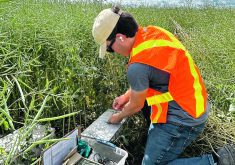Phosphorus is a plant nutrient with an essential role in helping farmers keep up with the world’s growing food demand. A recent reassessment of rock phosphate reserves calmed worries that the global resource was running low. However, it remains in the spotlight because the nutrient, from farm fertilizer, livestock manure and municipal sewage, washes into lakes and oceans, creating dead zones depleted of oxygen and aquatic life.
The Western Producer’s Robert Arnason reports on how an apparent phosphorus shortage turned into a comfortable supply and how researchers are finding ways to capture and recycle the nutrient so it does not pollute water.
Read Also

Organic farmers urged to make better use of trade deals
Organic growers should be singing CUSMA’s praises, according to the Canadian Chamber of Commerce.
On the surface, a report that says the world isn’t running out of phosphorus should be a good news story.
But scientists with the Global Phosphorus Research Initiative (GPRI) didn’t welcome the news with a smile and a hug.
The International Fertilizer Development Centre released substantially higher estimates of global phosphate reserves last September.
A few days later, the GPRI issued a four-page statement criticizing the report. Its scientists said the report endorses existing agricultural practices that threaten the world’s lakes, rivers and oceans.
“The report’s conclusions will only contribute to continued unsustainable means of using fertilizer… at a time when the need for sustainable development is being emphasized by most governments and UN bodies,” said the GPRI, a collaboration of research institutes in Canada, Europe and Australia.
The initiative, which is only a few years old, is part of a global movement of ecologists, scientists and engineers pushing for policy change when it comes to phosphorus and agriculture.
Fears about phosphorus and its potential impact on water quality will probably have a larger impact on future public policy than worries over phosphate shortages, said David Asbridge, who runs a fertilizer consultancy in St. Louis, Missouri.
“It’s probably more of concern as to what the environmentalists are going to cause us to do than what the phosphate rock reserves are.”
For example, he said, the Sierra Club, the largest environmental organization in the United States, is blocking the expansion of a phosphate rock mine in Florida.
European countries have already adopted new phosphorus regulations, passing mandates to recycle a percentage of phosphate from domestic sewage and other sources.
However, phosphorus sustainability remains an emerging issue in North America, said James Elser, a life sciences professor at Arizona State University.
“I think we’re still in the awareness building phase,” said Elser, who is also a member of the Global Phosphorus Network, which calls for less phosphate rock mining and more recycling and reuse of phosphorus.
Elser said positive steps have been taken, such as banning phosphates in detergent, but little has changed on North American farms.
“The hardest nut to crack … has been agricultural phosphorus runoff.”
Runoff from fields and livestock operations wasn’t a public policy issue a decade ago in Manitoba, said Ian Wishart, former president of Keystone Agricultural Producers.
That changed when massive algae blooms, some visible from space, appeared annually on Lake Winnipeg during the mid-2000s.
“In the old days in Manitoba, we were told phosphorus would never be an issue,” he said. “Our soils will tie it up, we’ll never have a problem.”
In 2008, the Manitoba government responded to public concerns about Lake Winnipeg by pointing a finger directly at agriculture.
It imposed a permanent ban on hog barn expansion in several regions of Manitoba and banned all winter spreading of manure by 2013.
Other provinces, with the exception of Quebec, haven’t adopted aggressive regulations regarding phosphorus and agriculture, Wishart said.
However, attitudes are changing in Ottawa, said Don Mavinic, a civil engineering professor at the University of British Columbia and GPRI member.














